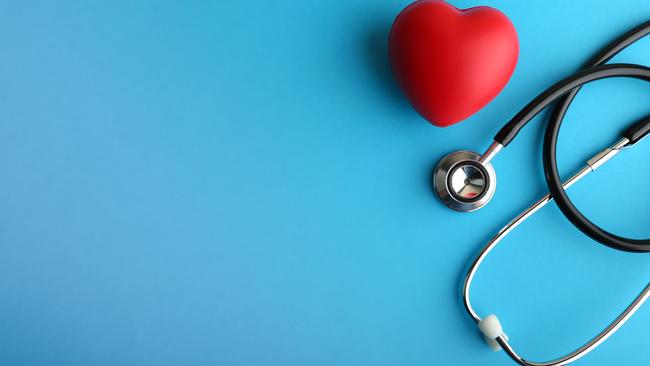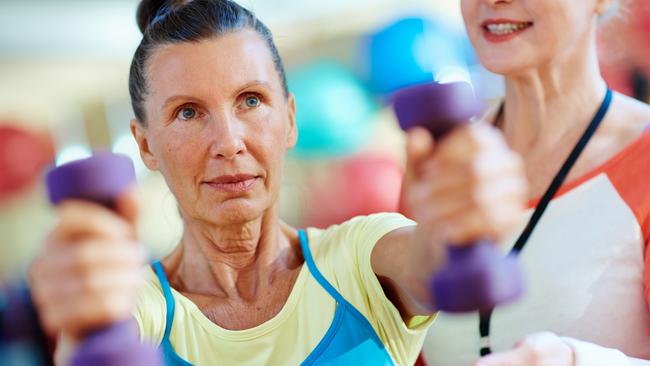Scientists say it is important to be heart fit at every stage of our lives
Scientists now say that optimum cardiovascular function is crucial for every aspect of health — even brain function — at every stage of life.

If you think you’re too young to worry about your heart health, think again. Millions of are living with cardiovascular heart disease – an umbrella term for a range of conditions affecting the heart muscle, arteries and valves that could result in a heart attack, abnormal heart rhythms or a stroke – and half of us will suffer from the condition in our lifetime.
In those under 65, the number of deaths from heart disease is rising, yet in many cases might be avoided with better awareness and lifestyle measures.
In a report published last month in the journal Lancet Neurology, a team of international researchers reported that worldwide stroke deaths could increase by 50 per cent by 2050, killing as many as 9.7 million people a year. The researchers found women also are likelier than men to die from strokes.
“There’s a definite increase in heart attacks in middle age but we are also seeing a rise in younger people, even those in their late 20s and early 30s, coming to hospital with heart problems,” Barts Heart Centre and Queen Mary University of London professor of cardiology Anthony Mathur says. “Some of these people are not necessarily living outrageously unhealthy lives and do a bit of exercise, so we need to make people aware that heart disease can sometimes be unpredictable in its targets.”
Optimum cardiovascular health is important for every part of us. After all, what’s good for the heart is also good for the brain. A report in 2020 by the Global Council on Brain Health, a panel of scientists and medical experts from around the world, revealed that cardiovascular issues including high blood pressure and high cholesterol increase the risk of memory loss and dementia. Looking after your heart and blood vessels with good lifestyle habits will boost memory and reduce the risk of cognitive decline.
So how can we tell how healthy our heart is? And what measures can we take to help make it healthier? Here’s what experts advise.

How weight and exercise affect your risk – especially in midlife
A healthy heart is the engine pump of your body, beating about 100,000 times a day to deliver five litres of blood, along with vital oxygen and nutrients, through your circulatory system.
“The heart is essentially the world’s best-designed pump, increasing and reducing the rate with which it has to supply blood around the body according to needs,” University of the West of Scotland professor of sports science John Brewer says. “As a muscle it generally responds to physical activity by becoming stronger and more efficient the more it is used.”
However, the functioning of a healthy heart can be reduced by a combination of risk factors including smoking and drinking, being overweight and underactive, and by raised cholesterol and high blood pressure. Across time these can contribute to the accumulation of fatty material (called atheroma) in the arteries around the heart and by middle age the effects can become apparent. “When arteries become narrowed, blood flow to the heart and brain is restricted,” HCA London Bridge Hospital consultant cardiologist and electrophysiologist Jonathan Behar says. “That is when heart disease happens.”
Is your diet helping or harming your heart?
“A heart-healthy diet is a balanced diet with plenty of vegetables, fruit, some fish and small amounts of red meat if you eat it,” Mathur says. Replacing high amounts of saturated animal fats, which can cause an increase in cholesterol, with polyunsaturated fats is also important.
A study in July from McMaster University in the European Heart Journal advised that consuming plenty of fruits, vegetables, legumes, nuts plus moderate amounts of fish and whole-fat dairy products is key to lowering the risk of cardiovascular disease.
Avoiding ultra-processed food was also highlighted in research presented at this year’s European Society of Cardiology Congress. In one study involving 10,000 Australian women, those with the highest proportion of ultra-processed food in their diet were 39 per cent likelier to develop high blood pressure than those with the lowest. Eating less salt is also important because too much raises blood pressure and increases the risk of cardiovascular disease. The recommended upper intake for adults is under 6g – one level teaspoon – of salt a day.

A little red wine is OK
“If you regularly drink in excess of 14 units a week it is not good news for your heart and your health,” Mathur says. However, he adds, an occasional drink is allowed and there’s some evidence, including a study in the Annals of Internal Medicine, that a moderate intake might help to protect the heart.
“A glass of red wine does contain some polyphenols, which might have a small medicinal effect, although no better than fresh fruit and vegetables,” Mathur says. “But it is about balance and inclusion only as part of an otherwise healthy lifestyle.”
A study in the American Journal of Physiology showed that while one glass of red wine slightly benefited heart and blood vessels, relaxing circulation and improving levels of biological markers for heart disease, the positive effects disappeared with two or more drinks.
The supplements worth taking: omega-3, turmeric or beetroot juice
Behar says there are dozens of nutritional supplements that have studies suggesting they might be helpful for a healthy heart but says “data is not robust enough for us to prescribe them”. His pick of the best includes omega-3 supplements, shown in a 2021 Lancet review of 38 randomised controlled trials to reduce cardiovascular mortality, although he says “other studies have shown eating oily fish to obtain omega-3 fatty acids is better for heart health” than supplements. Drinking a daily 140ml glass of beetroot juice, which is rich in beneficial nitrates, helped to restore function of the endothelium, the thin layer of cells that lines the inside of the heart and blood vessels, in studies at Queen Mary University of London.
“Turmeric is another that people like to try for its anti-inflammatory and protective effects,” Behar says.
Thousands of young people have undiagnosed high blood pressure. Get it checked
A “considerable” number of young people aged 16 to 24 unknowingly have risky high blood pressure and it’s best to have it checked. You can do this at the doctor’s, a pharmacy or at home, and the advice is to do so every five years.
Check your cholesterol if you are over 40
According to Britain’s National Health Service, as many as 56 per cent of men and 61 per cent of women in England are living with high cholesterol. Cholesterol is a type of blood fat that plays a vital role in nerve, brain and skin health and we all need some of it in our bodies to stay healthy. But too much cholesterol, particularly the “bad” variety called non-HDL or LDL cholesterol, in blood can lead to blockages in arteries and is a risk factor for heart disease and strokes. Some people are genetically predisposed to high cholesterol levels but smoking, drinking, lack of exercise and a poor diet along with the menopause can contribute to raised readings. Most people are not aware their cholesterol is creeping up, which is why tests are important.
Make sure there are 40 minutes of physical activity in your day
Exercise is important for lowering cholesterol, helping the body to shift bad cholesterol to the liver where it can be removed from your system. “Simple short bouts of exercise such as walking upstairs instead of taking the lift are important to incorporate daily,” Mathur says. “But the total equivalent of 40 minutes’ activity five times a week is the bare minimum.”
Exercise alone is rarely enough – you need a healthy diet and lifestyle too. And for some people, including those with a genetic predisposition to high cholesterol, statins, which work by disrupting the production of cholesterol in the liver, will need to be prescribed.

From your 20s, lift weights and do squats
Get into good exercise habits as soon as you can. Aerobic exercise such as power walking, cycling and running is essential for keeping your cardiovascular system in good working order, but resistance training is also important. Indeed, researchers reporting in the Journal of Physical Activity and Health showed that lifting weights and doing body-weight exercises such as squats, planks and lunges helps to decrease cholesterol and blood fat levels.
Isometric body-weight exercises are the static type that involve using your muscles to hold your body in certain positions such as a plank, squat hold or wall sits. It is advised that we should aim for two-minute holds of four isometric exercises with two minutes’ rest between – a total of eight minutes a couple of times a week.
Stretching is as important as weights and cardio
From middle age, our arteries become less flexible, with blood pressure rising as a consequence. Regular passive stretching – the kind in which you hold a position for a set time as with yoga postures – has been shown to help. One study published in the Journal of Physiology asked some healthy middle-aged participants to perform five repetitions of simple leg stretches for 45 seconds on each leg with 15 seconds’ rest between and repeating five times a week. After 12 weeks they had improved blood flow and reduced arterial stiffness in arms and legs, the researchers from the University of Milan found.
Check your resting heart rate once a week
Your resting heart rate – the number of times your heart beats a minute at rest – is one measure of how healthy your heart is. It is influenced by age and genetics but also by weight, general wellbeing and physical fitness. There are huge variations between individuals but for an average adult a RHR is usually about 60-100 beats per minute. A slow rate of below 60bpm, called bradycardia, can be normal for you if you are very fit but should be checked by a GP if you experience fainting or excessive tiredness.
It’s worth keeping tabs on your RHR once or twice a week, Behar says. A study in the BMJ Open Heart journal suggested that middle-aged men in their 50s and older with a RHR of 75bpm were at double the risk of death from coronary heart disease and cardiovascular disease.
Light-headed? Tired? It could be a sign of an irregular heartbeat
Atrial fibrillation is an irregular heartbeat that affects a significant number of adults. It is a result of the normal pumping action in the two upper chambers of the heart, called the atria, firing erratically and sometimes causing a rapid heart rate. Some people notice unusual palpitations, fatigue, light-headedness or slight breathlessness on exertion but in others there are no symptoms. Left untreated AF can lead to blood clots and heart failure as well as strokes. Using a tracker or an Apple watch, which can be set to flag up any abnormalities with your heart rate, is useful. You should be aware of risk factors for AF – smoking, carrying excess weight, a high salt intake or inactivity – and seek medical advice if you are concerned.
Are marathons, triathlons and HIIT risky?
Hardcore workouts and endurance challenges are sometimes perceived as putting pressure on the heart but being unfit in your 40s and 50s is far more of a risk than overdoing it. “In the majority of cases, more exercise is a good thing,” Behar says. Some studies have shown a temporary rise in chemicals in the blood after hardcore endurance exercise, which is sometimes indicative of injury to the heart chambers. “But the risks are relatively low and usually only affect people who have been endurance training at a high level for many years,” he says.
Indeed, for a 2020 study in the Journal of the American College of Cardiology researchers from University College London found first-time marathon runners, most of them midlifers, who jogged two to three times a week for six months before completing the 26.2-mile (42km) distance had arteries that were healthier and up to four years “biologically younger” than when they started running.

Should women take HRT to protect the heart?
Oestrogen has a protective effect on the heart, helping to control cholesterol levels and preventing furring of arteries, and when levels of the hormone drop during the menopause some of that protection is lost. Replacing oestrogen with hormone-replacement therapy is an option for some women although not all types bring benefits. A study at the University of Nottingham in 2019 warned that taking HRT in tablet form could raise the risk of developing blood clots, although other forms of HRT present a reduced risk and studies show that women taking HRT are not at a higher risk of a heart attack than women who don’t take it.
The warning signs you shouldn’t ignore
Chest pain, which can feel like tightness, pressure or arm pain, especially in the left arm, and unusual palpitations are the classic signs of a heart attack and could mean a medical emergency – you need to get help immediately.
But there are other, less well recognised signs of cardiovascular disease.
“Some people have very light symptoms and often these don’t become apparent until there is a problem,” Behar says. Feeling hot and clammy, being excessively breathless and sweaty, having a gripping or cramping feeling in the calves when you walk or pain in the jaw are all listed as warning signs. Swollen ankles because of the retention of fluid, called oedema, and a persistent cough, potentially the result of fluid build-up around the lungs, also should be seen by a doctor.
THE TIMES

To join the conversation, please log in. Don't have an account? Register
Join the conversation, you are commenting as Logout